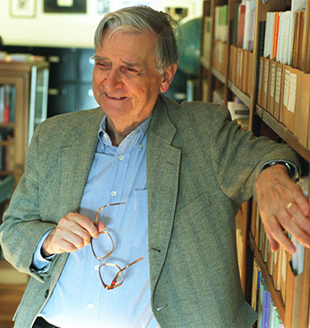

Edward O. Wilson (1929 )
“The successful scientist thinks like a poet but works like a bookkeeper.”
–Edward O. Wilson
National Medal of Science recipient in 1976 “for his pioneering work on the organization of insect societies and the evolution of social behavior among insects and other animals.”
Edward O. Wilson was born in Birmingham, Ala., and most of his childhood was split between the countryside around Mobile and the suburbs of Washington, D.C. As a young boy, Wilson enjoyed investigating nature in all its forms, but after a fishing accident left him blind in one eye, he focused his explorations on insects, which he could view through a microscope.
Wilson discovered the first colony of fire ants in the United States while he was still a student at Decatur Senior High School. He earned his bachelor's and master's degrees in biology from the University of Alabama, and went on to receive his Ph.D. from Harvard University in 1955. That same year, he married Irene Kelly, with whom he had one daughter, Catherine, in 1963.
As a fellow and then faculty member at Harvard, Wilson had the opportunity to travel the world, studying ants in the Pacific Islands, the American tropics and the Florida Keys. With Robert H. MacArthur of Princeton University, Wilson summarized his findings from this research in the 1967 book “The Theory of Island Biogeography,” still considered a standard reference text.
As his career progressed, Wilson expanded upon his research on ants to touch on broader themes of evolution, culture and ecology. A prolific author, Wilson’s landmark publications include 1992's “The Diversity of Life,” which synthesized critical issues in biodiversity, and 1998's “Consilience: The Unity of Knowledge,” which proposes uniting the sciences with each other and with the humanities.
He received the Pulitzer Prize for general non-fiction twice and in 2010, he published “Anthill: A Novel,” which won the Chicago Tribune’s Heartland Prize for fiction.
Wilson’s innovative, interdisciplinary work has led to the development of new fields of science, including chemical ecology, sociobiology, and biodiversity. His pioneering efforts in conservation inspired the development of the E.O. Wilson Biodiversity Foundation, which was launched in 2005 with the mission “to promote worldwide understanding of the importance of biodiversity and of the preservation of our biological heritage.”
Wilson, who retired from teaching at Harvard in 1996, remains a professor emeritus and honorary curator in entomology, and continues to publish texts on the importance of biodiversity and conservation.
“We should preserve every scrap of biodiversity as priceless while we learn to use it and come to understand what it means to humanity,” he said.
Image descriptions and credits
Any opinions, findings, conclusions or recommendations presented in this material are only those of the presenter grantee/researcher, author, or
agency employee; and do not necessarily reflect the views of the National Science Foundation.


